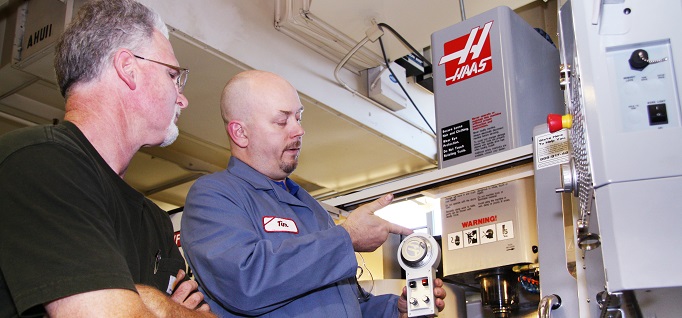A bridge to employment
By Dennis Pierce
December 7, 2017
Helping former inmates succeed in college and career training involves a plan and one-on-one attention.
Bates Technical College in Tacoma, Wash., is part of a statewide effort to connect prisoners with education and career training upon their release. These efforts begin while inmates are still on the inside.
As a reentry navigator, Hansen describes his role as a “bridge” to employment opportunities for inmates who are about to be released. He spends much of his time in the state’s correctional facilities, holding college nights and running peer-to-peer programs. He also meets individually with prisoners to discuss their plans for when they get out.
“When I sit down with them one-on-one, it’s about listening to who they are and what they want, but at the same time I have resources available from L&I (the state’s Labor & Industries Department) that indicate the jobs in high demand,” he says. “I use a profiler to come up with ideas for careers they might like. And I help them create a 72-hour plan that outlines their goals within the first three days of their release, while they still have momentum.”
Ideally, these goals would include attending Bates or another community college to get the job skills they’ll need for a stable career. Yet, encouraging them to enroll is easier said than done.
“The biggest challenge we face is getting them to come through the door for the first time,” Hansen explains. “These students don’t feel like they belong at a college. A lot of them are disenfranchised with education. Many were early dropouts. Their lifestyle growing up was not conducive to education.
Those who completed high school did so only because they showed up, but they weren’t really engaged in school. And some might still be reading at a third grade level.”
To overcome this barrier, Hansen tries to communicate the message: “You belong in college. Our college is built for you. College doesn’t have to be like what you’ve seen in the movies. There is a path for you, too.”
The Manufacturing Academy is a prime example. It’s an eight-week pre-apprenticeship program offered in conjunction with Tacoma’s Aerospace Joint Apprenticeship Committee (AJAC). During the program, students develop experience with basic hand tools, composites, metal fabrication, assembly, precision measuring tools, manufacturing equipment, blueprint reading and industrial safety, among other skills. They learn effective communication, resume writing and interviewing skills; earn six industry certifications, including CPR/First Aid and OSHA 10; and connect with local manufacturers and aerospace companies to discuss potential employment.
Getting former inmates comfortable with returning to school also involves building a sense of community.
“There is a big difference between reentry and reintegration,” Hansen says. “We want to make sure that when they do come through that door, they’re not alone—they feel like they belong here.”
Before inmates are released, he helps them fill out whatever paperwork they need to enroll and apply for benefits. Once they are released, he takes them to the campus and introduces them to the office staff. “I try to meet them where they are and walk them through the process,” he says. “That’s hard to do on a massive scale, so we are creating a peer-to-peer mentorship program as well. We’re using evidence-based practices from the Vera Institute of Justice to train mentors on campus.”
This is part of a longer article that will appear in the December/January issue Community College Journal.



